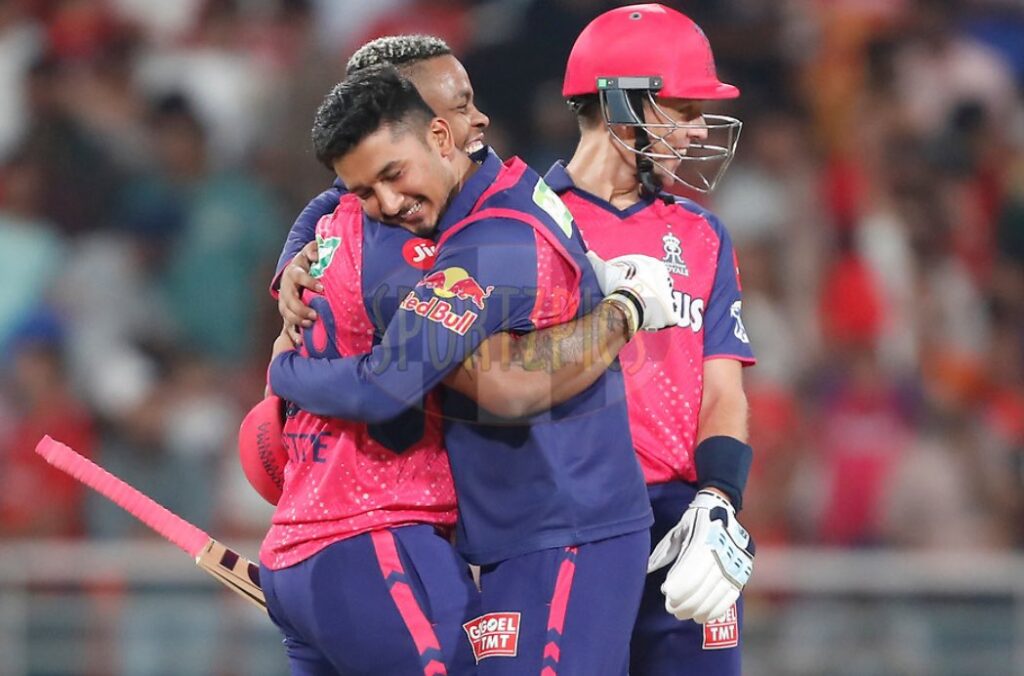
To begin with, Rajasthan Royals accurately assessed the pitch conditions. Opting for an additional spinner on a pitch historically favoring pacers was a daring decision, yet it proved fruitful. Punjab Kings, on the other hand, relied on just one specialist spinner, leading to difficulties in controlling the run rate during the middle overs.
As a result, the runs scored during this phase proved pivotal. Ashutosh Sharma’s brisk cameo of 31 runs bolstered PBKS to a total of 147, a target that seemed manageable for the in-form RR batting line-up. However, the match turned out to be closer than anticipated, yet RR emerged victorious in the end.
RR restrict PBKS to a sub-par total
After choosing to bowl first, RR made a strong start. Trent Boult and Avesh Khan bowled impressively, consistently challenging both edges of the PBKS batters. In the previous two games, RR bowlers failed to take any wickets during the Powerplay overs. However, Avesh ended this streak by dismissing Atharva Taide, who came in as a replacement for the injured Shikhar Dhawan. The pitch didn’t seem conducive to batting as it was on the slower side, prompting the spinners to come into play after the Powerplay.
Yuzvendra Chahal struck with his third ball, while Keshav Maharaj struck with his last ball of the first over, leaving PBKS struggling at 47/3. Stand-in captain Sam Curran also struggled, falling prey to the sluggishness of the wicket. Within a span of five overs, Punjab lost three wickets, with Maharaj claiming two and Chahal taking one. Even the big-hitters like Shashank Singh and Jitesh Sharma failed to make an impact. Both Avesh and Kuldeep Sen used the hard length really well, forcing the batters into risky shots. With wickets falling in clusters, Punjab found themselves constantly chasing the game.
Ashutosh’s impactful cameo
This season has witnessed the rise of Ashutosh Sharma. Introduced as an Impact Player, he ensured that he lived up to the tag. His quickfire innings of 31 runs off 16 balls proved crucial, lifting PBKS from 103/6 to 146/8. Ashutosh’s power-hitting played a vital role, enabling Punjab to score 61 runs in the final five overs. Beyond just raw strength, he exhibited maturity in his batting approach, carefully selecting his shots to consistently clear the boundary ropes.
Jaiswal back among runs
Before this game, Yashasvi Jaiswal faced immense pressure to perform with the bat, having recorded a series of low scores. Compounding the pressure, Jos Buttler was unavailable, leading to debutant Tanush Kotian surprisingly opening the innings with Jaiswal. This decision intensified the pressure on the southpaw, who began his innings cautiously. His approach during Powerplay indicated his determination to save his wicket.
Jaiswal survived the Powerplay overs with Kotian, marking the first instance of RR not losing a wicket in Powerplay overs this season. By the end of the Powerplay, the left-handed batter had reached 23 off 16 balls. Upon Sanju Samson’s arrival at the crease, Jaiswal was granted the freedom to accelerate, although he could only manage to score 39 off 28 balls. Nevertheless, this innings is poised to boost his confidence, possibly heralding a resurgence in Jaiswal’s form in the forthcoming matches.
Hetmyer steers RR to win
With 33 runs needed from 16 balls, Rovman Powell joined Shimron Hetmyer at the crease. While on other occasions, this might have seemed like a straightforward task favouring the batting side, the situation was challenging due to the tricky nature of the pitch and the presence of two new batters. Harshal Patel’s last two balls in the 18th over yielded two boundaries, leaving 20 runs required off the final two overs.
Powell departed after hitting two fours in the penultimate over, followed by Curran claiming two wickets. With 10 runs needed and Trent Boult at the non-striker’s end, Hetmyer remained composed and clinched the victory for his team with one ball to spare.




